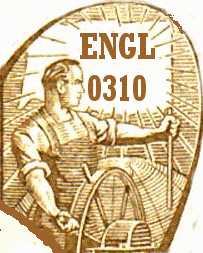
Writing Rules
Many of you in the Developmental English program at UTEP have come directly from high school. You may have made high grades in your writing courses there, and expect to make high grades here. However, to do so you will probably have to work much harder than you did in high school. Others are returning to school after a long time.
In any case, you need to become familiar with the grading guidelines that your English instructor will use in evaluating your paper. Here at UTEP, instructors reward papers as exceptional ("A" or "excellent"), very good or good ("B") or average ("C" or "OK"). Poorly written work receives a grade of "D" ("Pass") while clearly failing work receives an "F" ("rejected" or "fail").
(Please print out these simple rules and follow them in all your writing. More than three rule violations in any one practice assignment will normally mean an automatic rewrite. Every three rule violations in a quiz or test will mean a loss of one letter grade.)
|
THE
BIG THREE RULES!
|
Other important rules:
-
All formal writing assignments must be computer printed or submitted electronically. Handwritten work is normally acceptable only for first drafts or in-class writing practices. Work submitted electronically must be in a format compatible with MS Word, such as .doc, .rtf, .htm, .pdf or .txt. Work submitted in .wps, .wpd, .sxf, .tex, or other non-compatible formats will normally NOT BE ACCEPTED. Work turned in on digital storage media (flash memory chips, diskettes, floppies, CD-ROM's, Zip disks, tape, etc.) will normally not be accepted. If needed, please use our computer labs in Education 315 and 317. Each room has 25 computers with printer and internet access. The labs are staffed with faculty or trained tutors to provide you with individual assistance. All these services are free of charge.
-
Quoting in your papers from text sources is strongly encouraged. However, quotes should not exceed 400 words. Whenever you quote anything (words or information) from another source in your writing you must put the words in quotation marks, and say where the words or data came from. If you fail to do this, you may be accused of plagiarism (cheating) and may receive penalties up to and including failing the course or worse. You must clearly indicate within the text (by a citation, reference, or other method) where the information or words came from--just listing the sources at the end of the paper in a Works Cited or Bibliography list IS NOT SUFFICIENT!
-
UTEP has a strict policy against harassment or discrimination, which will be fully enforced in this class. No racist, sexist, homophobic or other discriminatory language is allowed in class, or in any writing assignment, written communication or online posting for this class.
-
You have academic freedom in this class, which means that, subject to the limitations above, your work in this class will be judged on the quality of your writing, never on the opinions or standpoints that you express.
O.W. rev 11/2005
For educational purposes only.
| Owen M. Williamson - Education Bldg 211E - phone: (915) 747 7625 - fax: (915) 747 5655 |
| The University of Texas at El Paso - 500 W. University Ave. - El Paso, TX 79968 |
| Important Disclaimer |

Open Courseware | OCW |This work is dedicated to the Public Domain..
